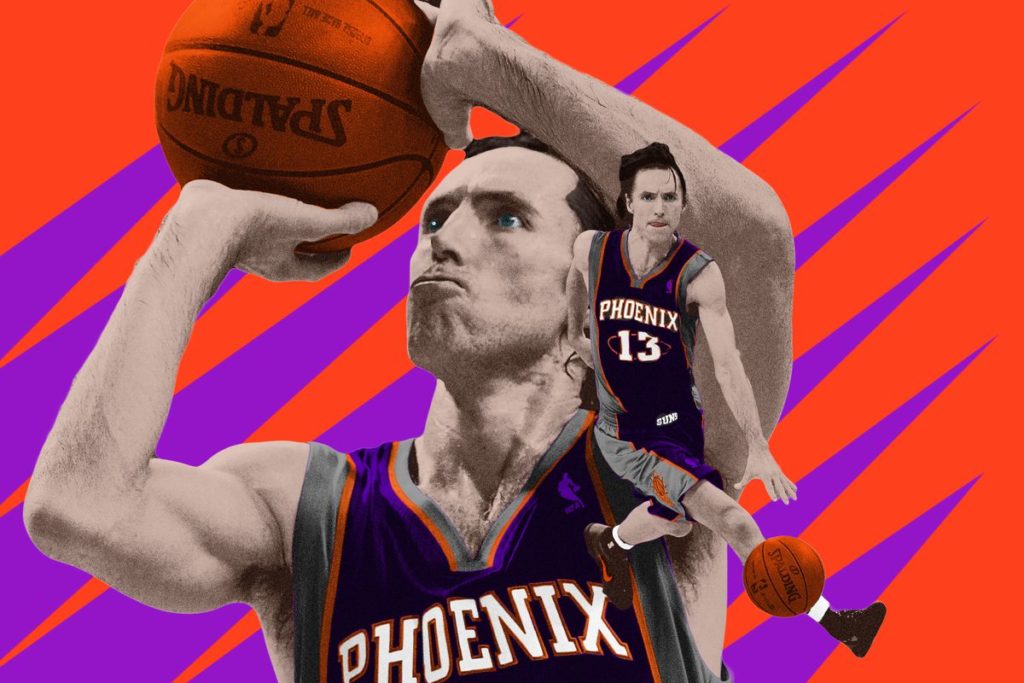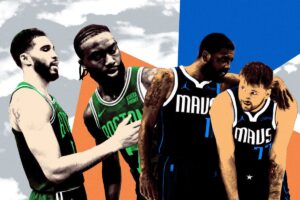For The 2nd Time In Franchise History, The Suns Aren’t Going All-In

Over the past two days, members of the 2018 NBA Draft Class have been getting paid. Jaren Jackson Jr, Kevin Huerter, Landry “The Goat” Shamet (who is now a Phoenix Sun and has never played a game for them), and Grayson Allen all enjoyed new contract extensions. Taking it one step further, Mikal Bridges got a 4-year contract extension to stay with the Suns.
But Deandre Ayton, another Suns youngster that helped them greatly last year in the postseason, will not get an extension. Ayton will have to wait until the next offseason to secure the bag, which might not even be with the Suns.
Ayton has been great with the Suns, but their hesitancy to pay Ayton speaks volumes to whether or not they’re going to keep him long-term. The Suns have been in this same situation before and the question is, will history repeat itself once again?
Grading The Mikal Bridges Extension
Before we talk about the Deandre Ayton situation, let’s talk about that 4-year deal that Mikal Bridges got yesterday. Bridges was a first-round pick in 2018, the same year as Ayton. Bridges has turned into one of the best young two-way wings in the NBA.
He’s a great shooter, the defense is there, and now he’s working to become better off the dribble. He was the full-time starter last year and was their reliable starting small forward throughout the playoffs. In return for a great 2021 plus that potential for the future, the Suns rewarded Bridges with a 4 year/$90 million dollar deal to stay with the team long-term.
Starting in the 2022-23 season, here is how much Bridges will be getting paid;
2022-23: $20,089,286
2023-24: $21,696,429
2024-25: $23,303,571
2025-26: $24,910,714
Bridges has certainly deserved this contract and I think he’ll become worth this money down the line. Now, I know that some people will think that this is an overpay. They will say that you can’t pay a guy $90 million if he’s only averaged 10 points per game for his career.
Again, this is just a friendly reminder that this is how rookie contract extensions work now. You are paying them based on what they have shown so far, but you’re also paying them for what you’re expecting for the next few seasons.
With Bridges getting his extension, it only seemed right that Ayton would have already gotten his money this offseason. But with that deadline already passed, Ayton will have to wait his turn. Why is that?
Why Didn’t Deandre Ayton Get Paid?
Ayton was the #1 overall pick in 2018, the same year that the Suns also took Bridges in the lottery. While Ayton will likely always be remembered as one of the two big guys taken over Luka Doncic, he has shown why he was picked so highly.
After two decent seasons for the Suns, Ayton put things together with Chris Paul at the helm. While his offensive output was down in the regular season, he was the Suns’ 3rd best player during the postseason. In 22 playoff games, Ayton did this;
15.8 points – 11.8 rebounds – 3 offensive rebounds – 67% TS – 0.9 DBPM
Ayton did it all in the playoffs. He was a monster on the rebounds, helping create so many 2nd chance opportunities for the Suns. He was efficient and he continued his excellent defensive play. He was the only reason Giannis didn’t average 60 points per game in the Finals and played a huge role in the Suns’ success.
If you see all those numbers, you would think Ayton would deserve a contract, right? I mean, I wouldn’t be hesitating if I were the Suns. Ayton wants to be in Phoenix, he will help you contend, this should all add up into a contract extension, right?
But something just doesn’t seem right. Ayton wants that 5-year/$172.5 million dollar extension that his other 2018 Draft Class peers have gotten. Guys like Luka Doncic, Trae Young, SGA, and MPJ have all gotten that contract this offseason. Ayton believes that he should be the next domino to fall.
That $172.5 million dollar contract extension could become $207 million if Ayton were to make an All-NBA team during the first year of his extension. Since that’s unlikely, a $172.5 million dollar extension doesn’t sound that bad.
But yet, Robert Sarver, the Suns’ owner, won’t budge. Sarver and the Suns haven’t been over the luxury tax since 2010, the last time the Suns were relevant. And Sarver has had a history of not paying his young, talented players before, even when championships were on the line.
Don’t believe me? Let’s take a trip back 16 years ago, to when the Suns were in an eerily similar situation.
Flashback
In 1996, the Phoenix Suns took Steve Nash with the 15th pick in the draft. 8 years later, in 2004, Nash signed a 6-year contract with the Suns worth $65.6 million dollars. Nash had established himself as one of the best point guards in the league, but his game went to new heights in his 2nd stint with the Suns.
Nash became an MVP with the 7 seconds or less offense, a scheme made by offensive genius/idiot Mike D’Antoni. The Suns were shooting 3’s, playing small-ball, and playing faster than anybody else in the league at the time. With other key pieces like Amar’e Stoudemire, Shawn Marion, Boris Diaw, Joe Johnson, and Leandro Barbosa, the Suns were a heavyweight in the West for years.
But they were never able to win a title, much less even make the Finals due to bad breaks and the worst of luck. Even though Nash was incredible and those offenses were revolutionary, they were never able to breakthrough. That could have been avoided if Sarver and the Suns had wanted to win a championship.
After the 2004-05 season, the Suns had a big decision to make. They had just won 62 games, Steve Nash won his first of two MVPs, and the Suns had gone to the Western Conference Finals. They were on the rise but they had a franchise-altering decision ahead of them.
Joe Johnson was a Restricted Free Agent in the summer of 2005. Johnson was drafted by the Celtics in 2001 but then was traded midway through his first season to the Suns. He became the starting wing in 2004 and the 2005 season was his best season yet, where he averaged 17 points a night. Johnson was a pure-scorer and was lethal in the 7 seconds or less offense.
Johnson was 23 years old and a great complimentary piece next to Nash, Marion, and Stoudemire. Given Stoudemire’s injury history, having Johnson was great insurance next to Nash. Since he was a restricted free agent, it seemed unlikely that the Suns would let their rising star go.
Enter Robert Sarver. The Suns’ owner had already spent hundreds of millions to buy the Suns and then spent big with free-agent acquisitions like Steve Nash and Quintin Richardson. He was hesitant to give Johnson the money that he wanted because he was a cheap piece of (censored).
The Suns offered Johnson a 6-year deal in the $60 million dollar range, which was still a lot lower than other teams were offering him. Johnson was not happy being the “4th wheel” on the Suns, behind Nash, Stoudemire, and Marion. He didn’t want to stay with the Suns and the low-ball contract was the nail in the coffin.
The Atlanta Hawks had offered Johnson a 5-year/$70 million dollar contract, which could pay him up to $20 million in the first year of the deal. Johnson of course wanted to accept that deal, but the Suns could just match the deal and Johnson would be forced to come back, where he would likely be the “4th wheel” when he felt like he should have the ball in his hands more.
So Johnson took matters into his own hands. He went to Sarver directly asked him to not match the contract. The Suns, not wanting to keep Johnson and his drama, got a sign-and-trade deal done with the Hawks. While that trade netted them Boris Diaw, who would be a great role player for them, they lost their budding star and more than that, potential championships.
The Suns never won a title and if they had kept Johnson, who knows? Stoudemire constantly dealt with injuries and as Nash got older, having Johnson as a budding star would have certainly helped the Suns. Instead, they let Johnson slip by the wayside just because he wanted to be the #1 option somewhere else. And because Richard Sarver is a cheap piece of (censored)
Will History Repeat Itself?
The Suns had a chance to win titles in the mid-2000s with their high-powered offense but lost one of their best pieces because of money. The situation we’re currently in mirrors it in a lot of ways.
The Suns just made the Finals, but their window to contend is closing as Chris Paul plays out the twilight of his career. They have a great roster and they just signed Mikal Bridges long-term. But why haven’t they done the same with Ayton?
Ayton is an excellent player who is now likely going to enter RFA in 2022 and get some big money elsewhere. Is there a guarantee he’s coming back, given how the two sides have been unable to make a deal work thus far?
It’s a stretch to see Ayton leave, given how that would make guys like Booker, Bridges, and CP-3 feel, but the fact that it’s gotten to this point doesn’t bode well. The Suns have been in this situation before and now it’s up to them to try and avoid the same mistakes as last time.
They have a chance to win a championship. They have great young players on the rise who can help them achieve their goals. But will Robert Sarver and the Suns get in their own way again? Only time will tell as the Suns try and finally bring a championship to the city of Phoenix.
What Will Happen With Deandre Ayton & The Suns? Leave A Comment Down Below!
Follow My Instagram/Facebook To Never Miss A Post: @hoopnotions



They need to pay Ayton. They aren’t a franchise that can get top tier free agents, so they need to secure any talent they draft. If they lose Ayton, it’s unlikely they are able to get an equivalent replacement to play alongside Booker while Booker is in his prime.